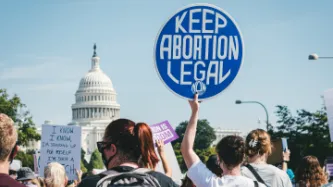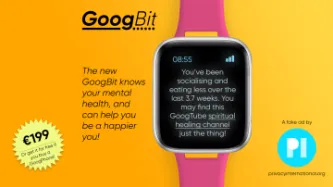Search
Content type: Long Read
IntroductionHarnessing new digital technology to improve people’s health is now commonplace across the world. Countries and international organisations alike are devising digital health strategies and looking to emerging technology to help solve tricky problems within healthcare. At the same time, more and more start-ups and established tech companies are bringing out new, and at times innovative, digital tools aimed at health and wellbeing.
Content type: News & Analysis
The relationship between privacy and access to abortion care
In 1973, in the state of Texas, it was a criminal offence to “procure or attempt” an abortion except if the purpose was “saving the life of the mother.” This law was enacted in 1854 by the Texas state legislature, and was part of a wave of provisions criminalising access to abortion care that was gaining ground across the U.S in the mid-1800s. It is worth highlighting that these laws were being passed at a time when women in the U.S…
Content type: Examples
Questions have been raised about an irregular process by which the Trump administration awarded a $10.2 million dollar six-month contract to Pittsburgh-based TeleTracking Technologies. TeleTracking has traditionally sold software to help hospitals track patient status; under the new contract it is collecting key data about COVID-19 from US hospitals, bypassing the Centers for Disease Control and Prevention, to which such data is normally reported. The contract was awarded by the Department of…
Content type: Examples
Manchester-based VST Enterprises is developing a rapid COVID-19 testing kit intended to help restart stadium sporting events. The results of tests, which fans will take the day before the event they wish to attend and provide results within ten minutes, will be stored in VSTE’s V-Health Passport, a secure mobile phone app into which users enter their name, address, date of birth, phone number, and doctor information, plus a scanned official identity document against which the smartphone can…
Content type: Explainer
At first glance, infrared temperature checks would appear to provide much-needed reassurance for people concerned about their own health, as well as that of loved ones and colleagues, as the lockdown is lifted. More people are beginning to travel, and are re-entering offices, airports, and other contained public and private spaces. Thermal imaging cameras are presented as an effective way to detect if someone has one of the symptoms of the coronavirus - a temperature.
However, there is little…
Content type: Examples
The New Zealand MP Hamish Walker, a member of the centre-right opposition National party, admitted leaking the details of all the country’s 18 active COVID-19 cases to the media in order to “expose the government’s shortcoming”. Walker said he had been advised that his actions were not illegal. The government has announced an independent inquiry.
Publication: Guardian
Writer: Eleanor Ainge Roy
Content type: Explainer
Definition
An immunity passport (also known as a 'risk-free certificate' or 'immunity certificate') is a credential given to a person who is assumed to be immune from COVID-19 and so protected against re-infection. This 'passport' would give them rights and privileges that other members of the community do not have such as to work or travel.
For Covid-19 this requires a process through which people are reliably tested for immunity and there is a secure process of issuing a document or other…
Content type: News & Analysis
Name: Google/Fitbit merger
Age: Gestating
Appearance: A bit dodgy. One of the world’s biggest tech giants, trying to purchase a company that makes fitness tracking devices, and therefore has huge amounts of our health data.
I don’t get it. Basically Google is trying to buy Fitbit. As if Google doesn’t already have enough data about us, it now wants huge amounts of health data too.
Oh, Fitbit, that’s that weird little watch-type-thing that people get for Christmas, wear for about a month…
Content type: Examples
Immunity passports are likely to increase discrimination and threaten fairness and public health - and won't work for practical reasons. First and foremost, scientists do not yet know whether infection confers immunity or for how long; the serological tests so far developed are insufficiently reliable; the volume of testing required is not feasible; and no country has enough survivors of COVID-19 to boost its economy. There are also numerous ethical objections.
Writer: Natalie Kofler and…
Content type: Long Read
Covid Apps are on their way to a phone near you. Is it another case of tech-solutionism or a key tool in our healthcare response to the pandemic? It’s fair to say that nobody quite knows just yet.
We’ve been tracking these apps since the early days. We’ve been monitoring Apple and Google closely, have been involved in the UK’s app process, our partners in Chile and Peru have been tracking their governments’ apps, and more.
Of course privacy concerns arise. But only a simplistic analysis would…
Content type: Explainer
In a scramble to track, and thereby stem the flow of, new cases of COVID-19, governments around the world are rushing to track the locations of their populace.
In this third installment of our Covid-19 tracking technology primers, we look at Satellite Navigation technology. In Part 1 of our mini-series on we discussed apps that use Bluetooth for proximity tracking. Telecommunications operators ('telcos'), which we discussed in Part 2, are also handing over customer data, showing the cell towers…
Content type: Examples
Liechtenstein is the first European country to use biometric electronic bracelets to implement a real time coronavirus tracking programme. The bracelet, which sends skin temperature, breathing, and pulse, among other metrics, for analysis in a Swiss lab, is being offered to 5% of the population. The country, which acted early to prevent the epidemic, plans to roll the bracelets out to the entire population by autumn.
Source: https://inews.co.uk/news/health/coronavirus-testing-latest-…
Content type: Examples
North Macedonia is the first country in the Western Balkans to launch a contact-tracing app. The government has stressed that the Bluetooth-based app, StopKorona!, complies with all legal privacy requirements. The app follows a decentralised design, so that users maintain full control over their data, which is deleted after 14 days; if they test positive for the virus they can choose to send their location history to the Ministry of Health so that their contacts can be alerted. The app was…
Content type: Examples
India's COVID-19 tracker app, Aarogya Setu, was downloaded 50 million times in the first 13 days it was available. Developed by the National Informatics Centre a subsidiary of the Ministry of Electronics and IT, the app is available on both Android and iOS smartphones, and uses GPS and Bluetooth to provide information on whether the phone has been near an infected person. Users provide a mobile number, health status, and other credentials, and must keep both location services and Bluetooth…
Content type: Examples
The Australian government's planned contact tracing app will reportedly be based on Singapore's TraceTogether, which relies on Bluetooth connections to detect other phones in range and log the results, so that if a phone user tests positive for COVID-19 and consents their close contacts can be alerted by uploading the logs to a centralised server. A second app, ConTrace, is in development for the Public Transport Information and Priority System; the prototype requires no personal information…
Content type: Examples
Palantir and the British AI start-up Faculty are data-mining large volumes of confidential UK patient information to consolidate government databases and build predictive computer models under contract to NHSx, the digital transformation arm of the UK's National Health Service. NHSx said the goal is to give ministers and officials real-time information to show where demand is rising and equipment needs to be deployed, and that the companies involved do not control the data and are not allowed…
Content type: Examples
Oura Rings, which measure body temperature and blood pulse volume to determine heart and respiratory rate and track sleep, are the subject of a national study being jointly conducted by the West Virginia University Rockefeller Neuroscience Institute, WVU Medicine, and Oura Health in hopes it can be used to predict infection and identify infected health workers before they become symptomatic. The rings and their accompanying smartphone app have been issued to physicians, nurses, and other…
Content type: Examples
An Excel file containing complete data pertaining to patients tested for coronavirus in the cities Quetta and Taftan in the the Balochistan region of Pakistan has been circulating in WhatsApp groups about Balochistan. The file contains information such as names, phone numbers, age address and other identifying information for the patients. The leaked data puts the patients at risk of personal harm and social stigma, even after recovery. Balochistan government officials say the data leaked…
Content type: Examples
The Kazakhstani ministry of health requires the 8,000 or so Kazakhstani citizens currently under quarantine to use the SmartAstana tracking app, which enables officials to ensure that they remain in isolation. By contrast, for the city of Almaty the ministry of the interior relies on video surveillance technology called Sergek, produced by the local telecommunications firm Korkem Telecom to find people who break quarantine . So far, these two cases are the only examples of the government…
Content type: Examples
Germany's federal agency responsible for disease control and prevention, the Robert Koch Institute, has teamed up with the health technology start-up Thryve to develop an app called Corona-Datenspende ("data donation") that works with a variety of smartwatches and fitness wristbands. The app is designed to use the device's sensors to collect user data, and includes algorithms to it to spot symptoms linked to COVID-19 and help predict the spread and containment of the virus. More than 50,000…
Content type: Examples
Anyone in Egypt who suspects they or others have COVID-19 is required to immediately report it to the authorities in order to stop the spread of the virus and enable treatment. On April 1 Ahmed Refaat, a member of the parliamentary Telecommunications Committee, submitted a proposal for creating an app that would track these cases and allow them to receive a test result without having to return to the testing centre. The proposed app would also provide daily updates on the virus's spread and the…
Content type: Examples
The Afghan Ministry of Public Health and Ministry of Telecommunications and Information Technology have launched the "corona.asan.gov.af" software to provide health advice in three English, Dari, and Pashto; using the questions embedded in the software users can evaluate themselves for the virus.
Source: https://tolonews.com/afghanistan/afghan-ministries-launch-coronavirus-tracking-app
Writer: TOLOnews
Publication: TOLOnews
Content type: Examples
GDPRHub is collecting a list of projects around the world that are using personal data to combat the novel coronavirus. The list is divided into categories such as decentralised contact tracing apps and frameworks; centralised contact tracing systems; lockdown enforcement; self-assessment apps; mapping projects; and statistical analysis. The site also tracks COVID-19-releated data protection issues.
Source: https://gdprhub.eu/index.php?title=Projects_using_personal_data_to_combat_SARS-…
Content type: Examples
On the second day of India's nationwide shutdown due to the COVID-19 outbreak, the Karnataka government published the home addresses of quarantined residents, as a deterrent to breaking the rules. The list included individuals who had flown in from a foreign country and been asked to stay indoors for two weeks but who had not tested positive for the novel coronavirus. Although the government deleted a tweet announcing its intention, the list is still available on its website and is circulating…
Content type: Examples
The company that makes the Natural Cycles women’s fertility app has added n optional service to allow users to track Covid-19 symptoms as well as positive and negative tests. As part of its fertility service, the app already takes each user’s basal body temperature daily; enabling the additional functionality is intended to help understand the spread of the virus and its effects across the world.
Source: https://www.independent.co.uk/life-style/health-and-families/health-news/coronavirus-…
Content type: Examples
The World Health Organization will partner with major blockchain and technology companies to launch a distributed ledger-based platform to be dubbed "MiPasa" that it says will facilitate "fully private information sharing between individuals, state authorities, and health institutions" by cross-referencing siloed location and health data to create global insights. The WHO believes the system can ensure patient privacy. MiPasa also expects to host an array of publicly accessible analytics tools…
Content type: Examples
The UK's National Health Service is collaborating with Palantir to launch a data platform that will track the movement of critical staff and materials; it will, for the first time, give ministers a dashboard showing the first-ever comprehensive view of the entire health care system. The data Palantir gathers into a data store from across the health sector will not include individual patient data; instead, it will include A&E capacity, calls to the NHS 111 hotline, and the number and…
Content type: Examples
Together with Norwegian company Simula the Norwegian Institute of Public Health is developping a voluntary app to track users geolocation and slow the spread of Covid-19. Running in the background, the app will collect GPS and Bluetooth location data and store them on a server for 30 days. If a user is diagnosed with the virus, its location data can be user to trace all the phones that have been in close contact with the person. Authorities will use this data to send an SMS only to those phones…
Content type: Examples
On March 20, the Peruvian government introduced a website where citizens can retrieve the results of tests for COVID-19. The site asks only for the patient to fill in their National ID number and a simple captcha, making it easy for unauthorised parties to access others' results and put people at risk of exploitation and discrimination.
Source: https://saludconlupa.com/noticias/peru-debilidades-de-plataforma-del-ministerio-de-salud-pueden-exponer-informacion-clinica-de-pacientes-covid-19…
Content type: Examples
The new Singaporean app, TraceTogether, developed by the Government Technology Agency in collaboration with the Ministry of Health was launched on March 20 after eight weeks of development. The app, which can be downloaded by anyone with a Singapore mobile number and a Bluetooth-enabled smartphone, asks users to turn on Bluetooth and location services, and enable push notifications. The app works by exchanging short-distance Bluetooth signals between phones to detect other users within two…






